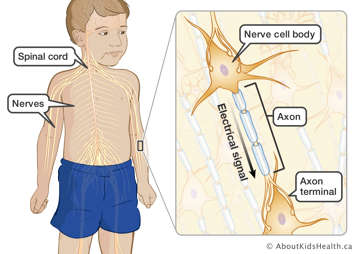In addition to eye damage and kidney disease, there are several other complications that can result from diabetes. These include nerve damage (neuropathy), foot problems (peripheral vascular disease), heart disease and stroke.
Nerve damage (neuropathy)
Electrical signals travel along nerves. Over time, repeated blood glucose (sugar) levels above target can affect the nerves in many areas of the body. Some people with diabetes develop symptoms and signs of more severe nerve damage, called neuropathy. This is very rare in children or teens.
Nerves

When nerves in the arms or legs are affected people may have:
- tingling
- numbness
- painful burning or freezing sensations, particularly in the feet
- throbbing.
Excellent blood sugar control can help prevent nerve damage.
Foot problems (peripheral vascular disease)
Children and teens rarely suffer from foot problems from diabetes. In adults, foot problems develop because of poor blood flow and nerve damage, which can increase the risk of infection and slow healing. A person with neuropathy can get a cut or blister on the foot and not even feel it. Even small blisters can become a serious problem if not recognized early. Adults with diabetes should have regular feet checks by a health-care provider.
Heart disease and stroke
As people age, so do their blood vessels. Fat in the blood can build up on blood vessels. This makes the blood vessels more narrow and may block blood flow. A blockage in the heart can lead to a heart attack; a blockage in the brain’s blood vessel can lead to a stroke. People with diabetes have a higher risk of heart disease and stroke. Fortunately, this almost never happens to children or teens.
To help prevent future problems, your child should:
- keep excellent blood sugar control
- keep blood pressure in check
- exercise regularly
- eat a healthy diet
- not smoke
- maintain healthy blood fats levels (cholesterol and triglycerides).
In teens with diabetes, blood cholesterol and triglycerides levels are measured to screen for problems. Blood fats levels outside of the normal range is called dyslipidemia.